S-39: Difference between revisions
Pbcjohnston (talk | contribs) (Created S-39 page) |
Pbcjohnston (talk | contribs) (Added S-39 and Canopus photo) |
||
| (3 intermediate revisions by the same user not shown) | |||
| Line 1: | Line 1: | ||
[[File:S-Boat Header 1.jpg]] | [[File:S-Boat Header 1.jpg]] | ||
<div style="text-align: justify;"><span style="color:#00008B"> | === <big>Notes</big> === | ||
<div style="text-align: justify;"><span style="color:#00008B">S-39 served the Navy and the nation well from 1923 to 1942. In the first nine months of WWII, she completed four war patrols earning two battle stars. On the night of August 13, 1942 she was on her fifth patrol of the southern tip of New Guinea in the Louisiade Archipelago. In very dark conditions and operating in a poorly charted area, she ran aground on a reef off Rossell Island. The sea conditions quickly made her situation untenable, and despite tremendous efforts by her crew, she could not be extracted from the reef. The captain radioed for assistance and the entire crew was rescued by an Australian corvette and taken to Brisbane. The sea action eventually destroyed the sub, along with repeated bombings by both Japanese and Allied forces. It is doubtful that anything of the wreck remains to this day. | |||
[[File:Red bar sub new.jpg]] | |||
[[File:S-39 stbd bow.jpg|left|500px]] | |||
<div style="text-align: justify;"><span style="color:#00008B">S-39 off Tsingtao, China, approximately 1927-1928. It looks like she has two torpedoes resting on the deck forward of the gun. They were likely fired in an exercise and retrieved for refurbishment and reuse. The photo was taken from the submarine tender USS Canopus (AS-9). | |||
<small>Photo provided by the late MMCM(SS) Rick Larson, USN (Ret.)</small> | |||
[[File:Red bar sub new.jpg]] | |||
[[File:S-39 surface 1.jpg|left|500px]] | |||
<div style="text-align: justify;"><span style="color:#00008B">S-39 surfacing off Tsingtao, China in the summer of 1931. The photo looks to have been taken around midday based on the shadow angles. She appears to be running at nearly full speed, judging by the wake. | |||
<small>Photo in the private collection of Ric Hedman.</small> | <small>Photo in the private collection of Ric Hedman.</small> | ||
[[File:Red bar sub new.jpg]] | |||
[[File:S-39 surface 2.jpg|left|500px]] | |||
<div style="text-align: justify;"><span style="color:#00008B">Closeup of the photo above showing details of the conning tower fairwater. The number 1 periscope is raised. A few of the interesting details seen are the small doors in the side of the fairwater aft. In some other photos one of these has proved to hide a shower head. Probably a salt-water shower since fresh water is a short supply aboard these vessels. | |||
<small>Photo in the private collection of Ric Hedman.</small> | |||
[[File:Red bar sub new.jpg]] | |||
[[File:S-39 bridge from above.jpg|left|500px]] | |||
A unique shot looking down into the bridge of the S-39 while she is moored in a nest along with [[S-41|'''S-41 (SS-146)''']] and others, early 1930's in the Far East. It is likely that this photo was taken from the deck of a tender, looking down at the boats. | |||
On the right in the photo is the bridge steering station, just behind the bridge fairwater. The empty ring may have held a gyrocompass repeater, removed for maintenance. Directly to the left is the S-39's magnetic compass binnacle, with arms protruding to each side that hold steel compensating spheres, whose purpose was to help correct for the deviations caused by the boat's steel hull. Below the compensating sphere arms on each side is an engine order telegraph, and just out of view between the compass binnacle and the open hatch to the conning tower is a seat for the helmsman, who sat astride the binnacle. The S-boats did not have a traditional wheel at this station, as they were electrically steered using a handheld left/right switch connected to the steering system by a cable. | |||
In the left center of the photo is the periscope shears, a structure used to support the periscopes. #1 periscope is raised, with the other two fully lowered. The S-class submarines had three periscopes, one that let into the conning tower (#1) and two that let into the control room. In between #2 and #3 periscope a drilled hole covering for the main air induction pipe can be seen. This large pipe with a valve on the top end supplied air for the big main diesels in the engine room. The top of the pipe was somewhat below this grating, and additional holes are drilled into the side of the shears to allow additional air in to the pipe while surfaced. | |||
Straddling the shears is a pipe-like bar supported on each end by triangular stanchions. This is a support structure for the boat's combination mine clearance and radio aerial wires that ran fore to aft. The very long radio aerial wires were needed to get the needed range from the relatively low-powered radio sets of the day. | |||
<small>Photo from the E.J. Hillin Scrapbook in the private collection of Ric Hedman.</small> | |||
[[File:Red bar sub new.jpg]] | |||
[[File:S-39 plus 1 and Canopus Chefoo.jpg|left|500px]] | |||
S-39 and another S-boat alongside the submarine tender [https://www.navsource.org/archives/09/36/3609.htm '''USS Canopus (AS-9)''']] in Chefoo, (now [https://en.wikipedia.org/wiki/Yantai '''Yantai''']) China in the early 1930's. | |||
Canopus, like the Dewey drydock in Subic Bay, Philippines, was a beloved and hard working member of the Asiatic fleet in this period. She went everywhere her charges went, providing not only repair services for the submarines, but supplies, ammunition, food, and any other sundry items as needed. She also gave the submarine crews a break from the hot and fetid submarine, giving them a chance to get a shower and relax. The ubiquitous tender also provided administration and bunking space for the crew's while in port. The only thing that would have endeared this ship more to the submarine crews was if she could dive, which she did once at the end of her career. She was scuttled by her crew to prevent capture by the Japanese in 1942. Her hulk still rests on the Manila Bay harbor bottom, just off [https://en.wikipedia.org/wiki/Mariveles '''Mariveles'''] at the tip of the infamous Bataan peninsula. | |||
<small>Photo from the E.J. Hillin Scrapbook in the private collection of Ric Hedman.</small> | |||
[[File:Red bar sub new.jpg]] | [[File:Red bar sub new.jpg]] | ||
Latest revision as of 20:00, 1 September 2024
Notes
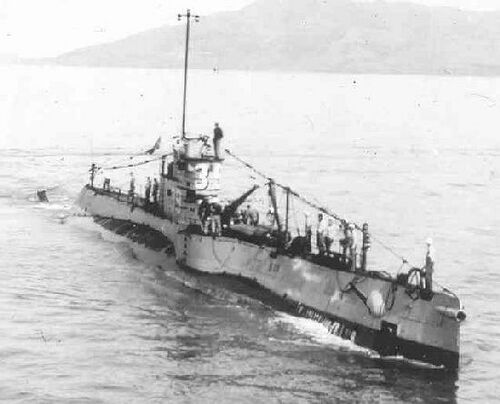
Photo provided by the late MMCM(SS) Rick Larson, USN (Ret.)
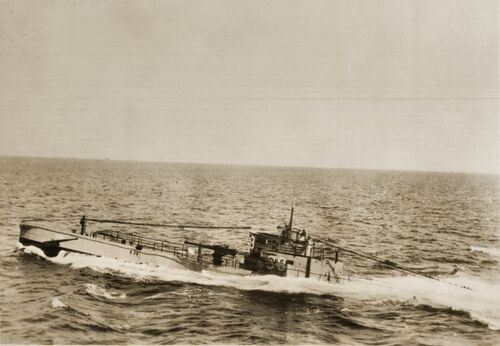
Photo in the private collection of Ric Hedman.
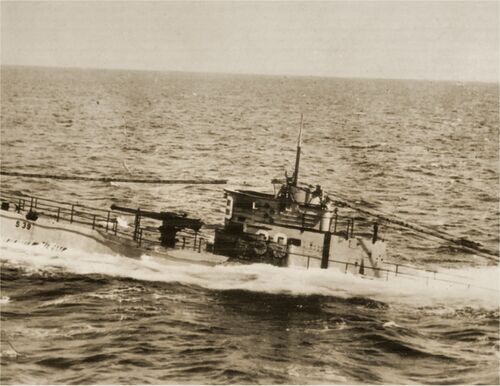
Photo in the private collection of Ric Hedman.
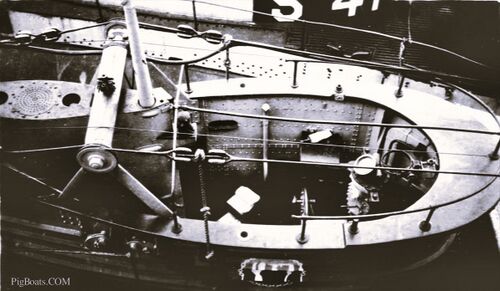
A unique shot looking down into the bridge of the S-39 while she is moored in a nest along with S-41 (SS-146) and others, early 1930's in the Far East. It is likely that this photo was taken from the deck of a tender, looking down at the boats.
On the right in the photo is the bridge steering station, just behind the bridge fairwater. The empty ring may have held a gyrocompass repeater, removed for maintenance. Directly to the left is the S-39's magnetic compass binnacle, with arms protruding to each side that hold steel compensating spheres, whose purpose was to help correct for the deviations caused by the boat's steel hull. Below the compensating sphere arms on each side is an engine order telegraph, and just out of view between the compass binnacle and the open hatch to the conning tower is a seat for the helmsman, who sat astride the binnacle. The S-boats did not have a traditional wheel at this station, as they were electrically steered using a handheld left/right switch connected to the steering system by a cable.
In the left center of the photo is the periscope shears, a structure used to support the periscopes. #1 periscope is raised, with the other two fully lowered. The S-class submarines had three periscopes, one that let into the conning tower (#1) and two that let into the control room. In between #2 and #3 periscope a drilled hole covering for the main air induction pipe can be seen. This large pipe with a valve on the top end supplied air for the big main diesels in the engine room. The top of the pipe was somewhat below this grating, and additional holes are drilled into the side of the shears to allow additional air in to the pipe while surfaced.
Straddling the shears is a pipe-like bar supported on each end by triangular stanchions. This is a support structure for the boat's combination mine clearance and radio aerial wires that ran fore to aft. The very long radio aerial wires were needed to get the needed range from the relatively low-powered radio sets of the day.
Photo from the E.J. Hillin Scrapbook in the private collection of Ric Hedman.
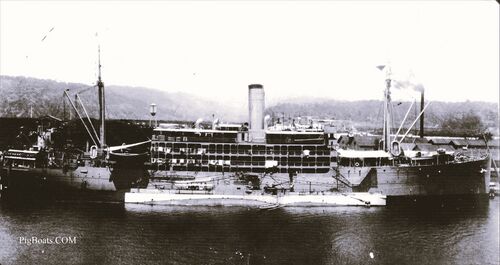
S-39 and another S-boat alongside the submarine tender USS Canopus (AS-9)] in Chefoo, (now Yantai) China in the early 1930's.
Canopus, like the Dewey drydock in Subic Bay, Philippines, was a beloved and hard working member of the Asiatic fleet in this period. She went everywhere her charges went, providing not only repair services for the submarines, but supplies, ammunition, food, and any other sundry items as needed. She also gave the submarine crews a break from the hot and fetid submarine, giving them a chance to get a shower and relax. The ubiquitous tender also provided administration and bunking space for the crew's while in port. The only thing that would have endeared this ship more to the submarine crews was if she could dive, which she did once at the end of her career. She was scuttled by her crew to prevent capture by the Japanese in 1942. Her hulk still rests on the Manila Bay harbor bottom, just off Mariveles at the tip of the infamous Bataan peninsula.
Photo from the E.J. Hillin Scrapbook in the private collection of Ric Hedman.
Page created by:
Ric Hedman & David Johnston
1999 - 2023 - PigBoats.COM©
Mountlake Terrace, WA, Norfolk, VA
webmaster at pigboats dot com
